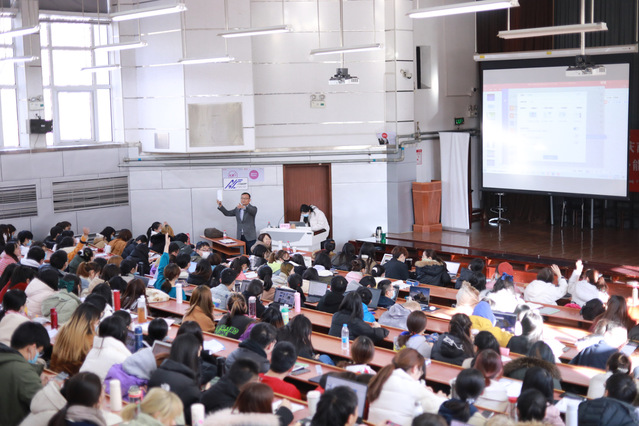
On December 3rd, the third lesson of “Situation and Policy” course in the College of Foreign Languages successfully began lecturing in the auditorium of the college. Professor Li Xiaobing from School of Law in Nankai University, Executive Director of the Research Center of Law in Taiwan, Hongkong, Macao was invited to make a speech entitled “Practice, Development and Transition of ‘One Country, Two Systems’ in Hongkong, Macao and Taiwan”. All the undergraduate students in the college attend this lecture on-site and online.
Li Xiaobing initially introduced the development of Hong Kong and Macao and the proposal background of “one country, two systems” plan as well as the process of its practice and development from perspectives of geography and history. He mentioned that with the implementation of “two checks in one place” cooperated arrangement of Guangzhou-Shenzhen-Hong Kong high-speed railway, the completion and operation of Hong Kong-Zhuhai-Macao Bridge and the issuing of Outline Development Plan for the Guangdong-Hong Kong-Macau Greater Bay Area, the practice of “one country, two systems” in Hong Kong-Macao Special Zone stepped into a new historical stage where integrated development of Hong Kong-Macao Special Zone and the mainland of China becomes the main trend. In the future, the Hong Kong-Macao Special Zone would keep expanding the width and depth, increasing the height and level, maintaining the openness and creativity of the “one country, two systems” practice. The construction of Guangdong-Hong Kong-Macau Greater Bay Area requires further establishing the interconnectivity cooperation on infrastructure and facility and eliminating barriers on the policy.
Then, starting with the “proposed amendment events” happening in 2019 Hongkong, Li Xiaobing analyzed problems and challenges which “one country, two systems” practice was confronted with. He elaborated the influence of “proposed amendment events” on the governance of Hong Kong Special Administrative Region, development of the relations between the two sides of the Taiwan Straits and practice, development and transition of “one country, two systems” in simple terms. He specially pointed out that the deep interference of the United States in the internal affairs of Hong Kong brought about the transformation from “the United Kingdom withdrawing while the United States advancing” to “the United States playing a leading role” and changed Hong Kong into a “battlefield for mercenary” of the United States, thus adding new variable factors in the relations between China and the United States. Next, Li Xiaobing introduced a series of measures, taken by our country to restore the basic social order of Hong Kong, safeguard national sovereignty, security and development interests, including the Decision of the National People’s Congress on Establishing and Improving the Legal System and Enforcement Mechanisms for Safeguarding National Security in the Hong Kong Special Administrative Region, the Standing Committee of the National People's Congress formulating and passing The Law of the People’s Republic of China on Safeguarding National Security in the Hong Kong Special Administrative Region and its publication on the constitution alongside its implementation, which opens an umbrella of national security for Hong Kong Special Administrative Region from the aspect of the country in order to set up defenses for Hong Kong.
Finally, Li Xiaobing summed up the basic points of Hong Kong Special Administrative Region’s “one country, two systems” practice and development through several key words, “one country”, “two systems”, “three times of political reforms”, “four terms of chief executives”, and “five times of Standing Committee of the National People's Congress’ interpretation of the Basic Law,” and put forward that Hong Kong’s practice of “one country, two systems were supposed to achieve three main historical transformations, namely, transformations from reunification to governance, from separation to integration and from ending past humiliation to the renewal of the Chinese nation.
This “Situation and Policy” course led students to know the Chinese wisdom reflected from a plan to the practice of “one country, two systems” with vivid cases and profound explanation. Xiang Yu, Deputy Secretary of CPC Committee in the College of Foreign Languages and Vice Dean of the college made a summary for this lecture and urged all students to keep the mission of students majoring in foreign languages firmly in mind, cultivate profound patriotism, broaden their international view, pay attention to the change of the role played by China in the process of global governance and do their bit for achieving the reunification and a greater success in “one country, two systems” practice of Hong Kong and Macao Special Administrative Regions through their unremitting efforts.



